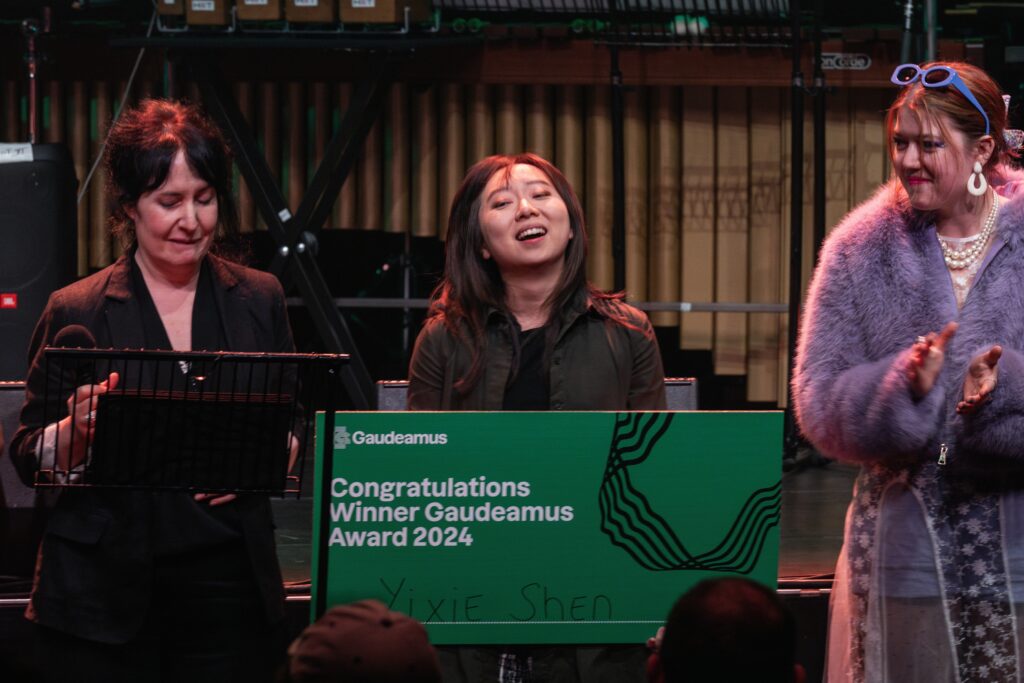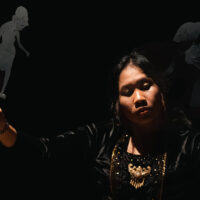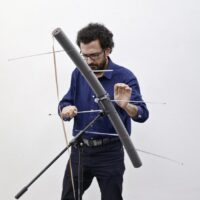Gaudeamus Award 2026
DEADLINE FOR THE GAUDEAMUS AWARD WAS 1 OCTOBER 2025 23:59 CET
The Gaudeamus Award is our yearly incentive prize for young composers. Ever since the first winner (Peter Schat in 1957) the Award has been a kickstart for the career of many composers.

Gaudeamus Award 2024 winner Yixie Shen, flanked by jury member Joanna Bailie (l) and fellow nominee Lucy McKnight (r)
A maximum of four composers will be nominated for the Award. The nominees will be part of the Gaudeamus Festival 2026 (9-13 September). On the final night of the festival the winner of the Award will be chosen by an independent jury. The prize consists of a commission worth €6,000 for a new composition to be premiered at a future edition of the Gaudeamus Festival. The nominees’ main entries for the competition will be performed during the festival. They will also be commissioned to develop a new piece especially for the festival. After the festival, Gaudeamus will continue to support the nominated composers. Selected works may be performed elsewhere, and composers will be regularly involved in festivals and co-productions with other organizations. The intention is to further the career development of young composers.
As of this year we don’t work with fixed categories anymore. You may now send in any work as your main entry up to a maximum of 16 instruments. You are welcome to send in more traditional forms (like sinfonietta, string quartet, Pierrot ensemble + percussion, etc.) but also encourage to send in music installations, multi- or interdisciplinary works, works with electronics, works by composer/performers, or unusual instrumentations.
Jury
The formation of the jury is crucial for a broad selection of nominees. We always form the jury with composers/performers, representing the broad spectrum of contemporary music. As a rule, the jury members are all teachers as well, at a school or privately, and the jury members will coach the nominees during the preparations for the festival. For 2026, the jury consists of Peni Candra Rini, Hardi Kurda and Ash Fure.
 Peni Candra Rini is a renowned Javanese singer, composer, and faculty member at the Indonesian Institute of the Arts. The Kronos Quartet has described her as “one of the world’s greatest singers.” She is a master of several traditional forms and is regarded as one of Indonesia’s most daring young composers, one of only a handful of female composers of the country.
Peni Candra Rini is a renowned Javanese singer, composer, and faculty member at the Indonesian Institute of the Arts. The Kronos Quartet has described her as “one of the world’s greatest singers.” She is a master of several traditional forms and is regarded as one of Indonesia’s most daring young composers, one of only a handful of female composers of the country.
 Hardi Kurda is a sound artist, holding PhD in music at Goldsmiths, University of London, and curator of SPACE21 Sound Gallery in Slemani. He uses radio frequency to explore noises that may have been considered illegal, abandoned, unheard, invisible, broken, distorted, untold, forgotten, or simply noises from nowhere, without a place or destination.
Hardi Kurda is a sound artist, holding PhD in music at Goldsmiths, University of London, and curator of SPACE21 Sound Gallery in Slemani. He uses radio frequency to explore noises that may have been considered illegal, abandoned, unheard, invisible, broken, distorted, untold, forgotten, or simply noises from nowhere, without a place or destination.
 Ash Fure makes full-bodied sonic experiences that work on the senses in startling ways. Called “purely visceral” and “staggeringly original” by The New Yorker, Fure’s live performances and total installations mobilize the elemental force of sound, the social muscle of listening and our animal capacity to sense. She is an Associate Professor of Sonic Arts at Dartmouth College.
Ash Fure makes full-bodied sonic experiences that work on the senses in startling ways. Called “purely visceral” and “staggeringly original” by The New Yorker, Fure’s live performances and total installations mobilize the elemental force of sound, the social muscle of listening and our animal capacity to sense. She is an Associate Professor of Sonic Arts at Dartmouth College.
Side Reader Procedure
This year, the jury will be supported by three side readers. Each jury member will be paired with one side reader. Each pair (of one jury member and one side reader) will review one third of all the submissions in order to select the longlist to be reviewed by the full jury. In this way, we ensure that all the submissions are reviewed by at least one jury member and that all the submissions are reviewed by two pairs of eyes. The whole process is chaired by the Gaudeamus team. The side readers this year are Bekah Simms, Hugo Morales and Robin de Raaff.
Propelled equally by fascination and terror toward the universe, Bekah Simms‘ work is often filtered through the personal lens of their anxiety, resulting in nervous, messy, and frequently heavy electroacoustic musical landscapes.
Working the boundaries between traditional instruments, instrumental found objects, performance technique and technology, the development of alternative forms of sound generation for music composition is essential in Hugo Morales‘ work.
Robin de Raaff composes concertos and orchestral works. He breathes new life into expressionistic forms of expression. He curiously opens the playbook of Debussy, Mahler and Alban Berg, only to put his own spin on it with the jazz rock from his youth.
Gaudeamus Academy 2026
In the week before the Gaudeamus Festival (9-13 September 2026), the 4 nominated composers will work with the focus ensembles on their newly commissioned works and rehearse the selected works. The focus ensembles for 2026 will be known in October 2025. Members of the jury will facilitate discussions between composers and musicians. The Gaudeamus Academy will be devoted to the composers in the interest of research, reflection, and development, but will also feature meetings and workshops open to the public.
Registration fee & accommodation
The registration fee for the competition is € 35. After you are selected, accommodation and participation in the festival are free of charge. Also, the travel costs to and from Utrecht will be reimbursed to the participant. If for any reason, the registration fee is an obstacle that is preventing you from partaking in this call, please contact us via gaudeamusaward@gaudeamus.nl and we will see how we can accommodate you.
Questions
If you have any questions about the registration, please contact us via gaudeamusaward@gaudeamus.nl
You can now register for the Gaudeamus Award 2026 via the form below. Composers/creators of any nationality or background who were born after 13 September 1990 may enter their works. Works may already have been performed but must be composed no more than 4 years ago.
We ask you to submit 3 pieces:
1. Your main entry for a maximum of 16 instruments, free choice of instruments, electronics, etc.
2&3. Two additional pieces to show the breadth of your practice as a composer/creator, again restricted to a maximum of 16 instruments.
Please carefully read the information below and the terms and conditions before submitting!